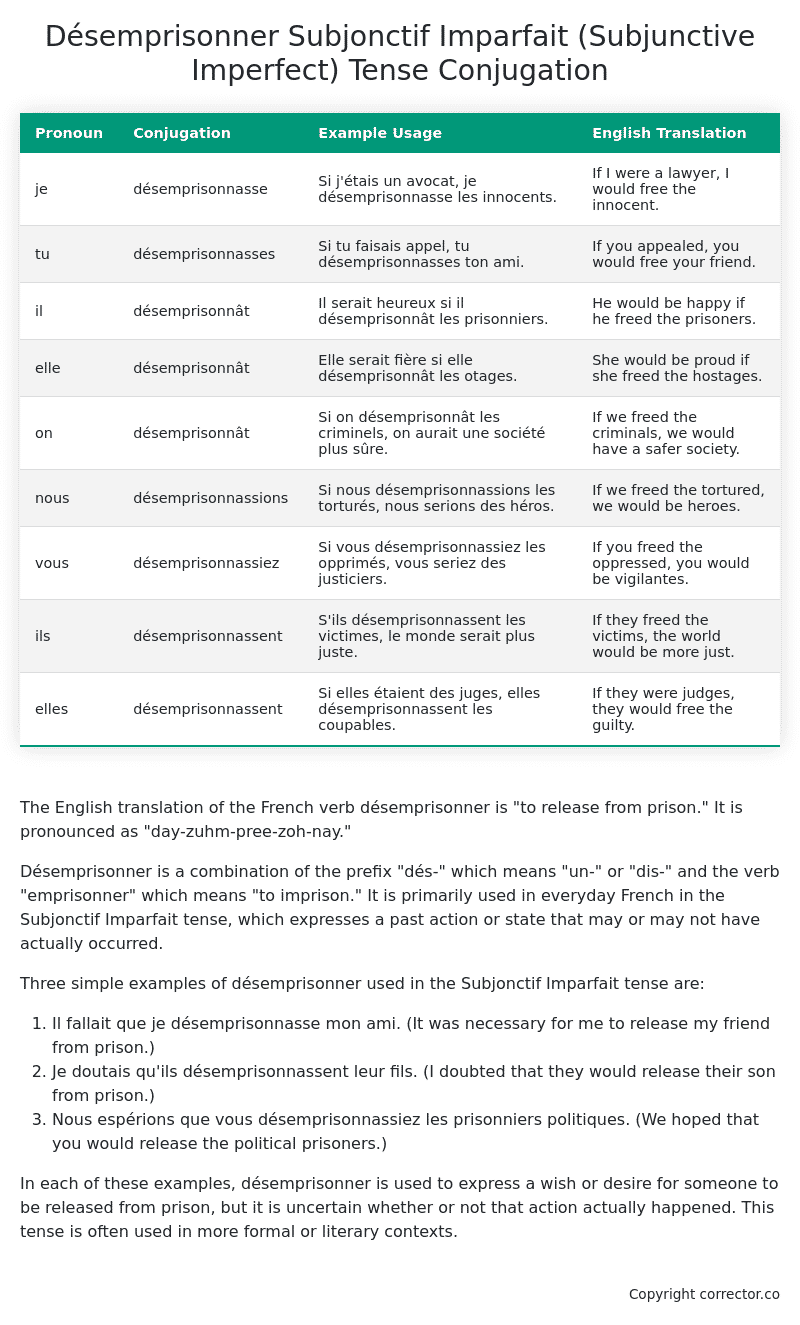Subjonctif Imparfait (Subjunctive Imperfect) Tense Conjugation of the French Verb désemprisonner
Introduction to the verb désemprisonner
The English translation of the French verb désemprisonner is “to release from prison.” It is pronounced as “day-zuhm-pree-zoh-nay.”
Désemprisonner is a combination of the prefix “dés-” which means “un-” or “dis-” and the verb “emprisonner” which means “to imprison.” It is primarily used in everyday French in the Subjonctif Imparfait tense, which expresses a past action or state that may or may not have actually occurred.
Three simple examples of désemprisonner used in the Subjonctif Imparfait tense are:
- Il fallait que je désemprisonnasse mon ami. (It was necessary for me to release my friend from prison.)
- Je doutais qu’ils désemprisonnassent leur fils. (I doubted that they would release their son from prison.)
- Nous espérions que vous désemprisonnassiez les prisonniers politiques. (We hoped that you would release the political prisoners.)
In each of these examples, désemprisonner is used to express a wish or desire for someone to be released from prison, but it is uncertain whether or not that action actually happened. This tense is often used in more formal or literary contexts.
Table of the Subjonctif Imparfait (Subjunctive Imperfect) Tense Conjugation of désemprisonner
| Pronoun | Conjugation | Example Usage | English Translation |
|---|---|---|---|
| je | désemprisonnasse | Si j’étais un avocat, je désemprisonnasse les innocents. | If I were a lawyer, I would free the innocent. |
| tu | désemprisonnasses | Si tu faisais appel, tu désemprisonnasses ton ami. | If you appealed, you would free your friend. |
| il | désemprisonnât | Il serait heureux si il désemprisonnât les prisonniers. | He would be happy if he freed the prisoners. |
| elle | désemprisonnât | Elle serait fière si elle désemprisonnât les otages. | She would be proud if she freed the hostages. |
| on | désemprisonnât | Si on désemprisonnât les criminels, on aurait une société plus sûre. | If we freed the criminals, we would have a safer society. |
| nous | désemprisonnassions | Si nous désemprisonnassions les torturés, nous serions des héros. | If we freed the tortured, we would be heroes. |
| vous | désemprisonnassiez | Si vous désemprisonnassiez les opprimés, vous seriez des justiciers. | If you freed the oppressed, you would be vigilantes. |
| ils | désemprisonnassent | S’ils désemprisonnassent les victimes, le monde serait plus juste. | If they freed the victims, the world would be more just. |
| elles | désemprisonnassent | Si elles étaient des juges, elles désemprisonnassent les coupables. | If they were judges, they would free the guilty. |
Other Conjugations for Désemprisonner.
Le Present (Present Tense) Conjugation of the French Verb désemprisonner
Imparfait (Imperfect) Tense Conjugation of the French Verb désemprisonner
Passé Simple (Simple Past) Tense Conjugation of the French Verb désemprisonner
Passé Composé (Present Perfect) Tense Conjugation of the French Verb désemprisonner
Futur Simple (Simple Future) Tense Conjugation of the French Verb désemprisonner
Futur Proche (Near Future) Tense Conjugation of the French Verb désemprisonner
Plus-que-parfait (Pluperfect) Tense Conjugation of the French Verb désemprisonner
Passé Antérieur (Past Anterior) Tense Conjugation of the French Verb désemprisonner
Futur Antérieur (Future Anterior) Tense Conjugation of the French Verb désemprisonner
Subjonctif Présent (Subjunctive Present) Tense Conjugation of the French Verb désemprisonner
Subjonctif Passé (Subjunctive Past) Tense Conjugation of the French Verb désemprisonner
Subjonctif Imparfait (Subjunctive Imperfect) Tense Conjugation of the French Verb désemprisonner (this article)
Conditionnel Présent (Conditional Present) Tense Conjugation of the French Verb désemprisonner
Conditionnel Passé (Conditional Past) Tense Conjugation of the French Verb désemprisonner
L’impératif Présent (Imperative Present) Tense Conjugation of the French Verb désemprisonner
L’infinitif Présent (Infinitive Present) Tense Conjugation of the French Verb désemprisonner
Struggling with French verbs or the language in general? Why not use our free French Grammar Checker – no registration required!
Get a FREE Download Study Sheet of this Conjugation 🔥
Simply right click the image below, click “save image” and get your free reference for the désemprisonner Subjonctif Imparfait tense conjugation!

Désemprisonner – About the French Subjonctif Imparfait (Subjunctive Imperfect) Tense
Formation
Common Everyday Usage Patterns
Interactions with Other Tenses
Subjonctif Présent
Indicatif Passé Composé
Conditional
Conditional Perfect
Summary
I hope you enjoyed this article on the verb désemprisonner. Still in a learning mood? Check out another TOTALLY random French verb conjugation!


